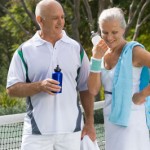A must have for active people… or not
 Last week, the CBC reported on a Marketplace segment that took a hard look at these products. We know them by brands such as Gatorade, All Sport, and Accelerade, among others. They all claim to rehydrate and restore your body’s electrolyte levels after exercise. Electrolytes are minerals that include potassium and sodium – they are important to the healthy function of your cells, and you can deplete them during exercise.
Last week, the CBC reported on a Marketplace segment that took a hard look at these products. We know them by brands such as Gatorade, All Sport, and Accelerade, among others. They all claim to rehydrate and restore your body’s electrolyte levels after exercise. Electrolytes are minerals that include potassium and sodium – they are important to the healthy function of your cells, and you can deplete them during exercise.
But guess what? Most of us are not high-performance athletes. According to the health experts interviewed by Marketplace, most of us do not exercise intensely enough to warrant the need for a special electrolyte supplement.
What do you need most for the typical spin class, yoga class, or weight-lifting session?
Plain old water.
Now, you might be inclined to say, “oh well, I’ll have that sports drink anyway – what harm can it do?”
Well, let’s see, taking the example of Gatorade’s Glacier Cherry Perform drink in its 710 ml serving size.
Chug back this jug, and you’re consuming 41 grams of sugar – that’s more than 10 teaspoons of the white stuff. That’s about the same amount of sugar as you find in a 355 ml can of a soda like Coca-Cola.
And then there’s the sodium, about 330 mg of it. The daily recommended amount is between 1,000 and 1,500 mgs. At 330 mg, that Gatorade has more sodium than a McDonald’s medium fries, or a serving of Doritos Cool Ranch chips.
In short, by having that sports drink, you may be consuming such a dose of sugar and salt it’s sabotaging your fitness efforts.
Definitely not for kids
And let’s not overlook the other hidden evils of these synthetic foods – added colourings and preservatives. We’ve written before about how many of these additives have proven to warrant suspicion due to potential harmful side effects that range from cancer risk, to behavioural and developmental issues in children.
Our Dr. Paradis recently had a conversation about these products with his family. Someone his kids knew drank sports drinks, so, naturally, they wanted them too. His kids just didn’t understand why he said no.
It can be tough to battle the corporate marketing machine and resist the pressure to follow the herd. It’s always hard to say no to your child, but as parents, it’s our job to prioritize what our kids need (or don’t) over what they want. Children have the excuse that they’re not yet old enough to know better. Adults don’t.
Fruit juice is only a lesser evil
To not be a total bore, Dr. Paradis instead gave his kids a somewhat smaller serving of pure apple juice. Not the best choice, but arguably the lesser of two evils. As we’ve discussed before, fruit juice again is another big dose of sugar. The fact that this form of sugar, fructose, is what is found “naturally” in an apple and other fruit doesn’t matter. Sugar is sugar and just as bad for you regardless of its type or source. That’s why the Canada Food Guide has finally been revised to strike fruit juices (even 100 per cent pure ones) as an option to get your daily dose of fruits and veggies.
Bottom line, if you don’t need sports drinks after exercise, your kids surely don’t. All they need is water and maybe a serving of real fruit that contains dietary fibre and lots of other nutritional goodies to restore their spent energy in a healthy way.
Having said all this, here is a statistic we find scary. According to consumer research firm Nielson, sales of sports drinks in North America jumped by 35 per cent during the back-to-school season last year. While that report suggests a growing awareness and demand for products that are low in sodium and free of additives, it’s still a serving of sugar our kids just don’t need.
A better post-workout pick-me-up
If your workout is leaving you feeling too depleted afterward, consider a different form of supplement, like a high-quality whey protein or vegan protein shake. Drinking protein in liquid form within 30 minutes of exercise provides fresh fuel for your muscles that is ingested much faster than solid food. Then make sure to eat a solid meal within 90 minutes or so of exercise.
But again, do your homework when it comes to protein shakes – some supplements are much more like candy than others, loaded with undesirable additives and sweeteners. If you need help making a wise choice, come talk to us.
